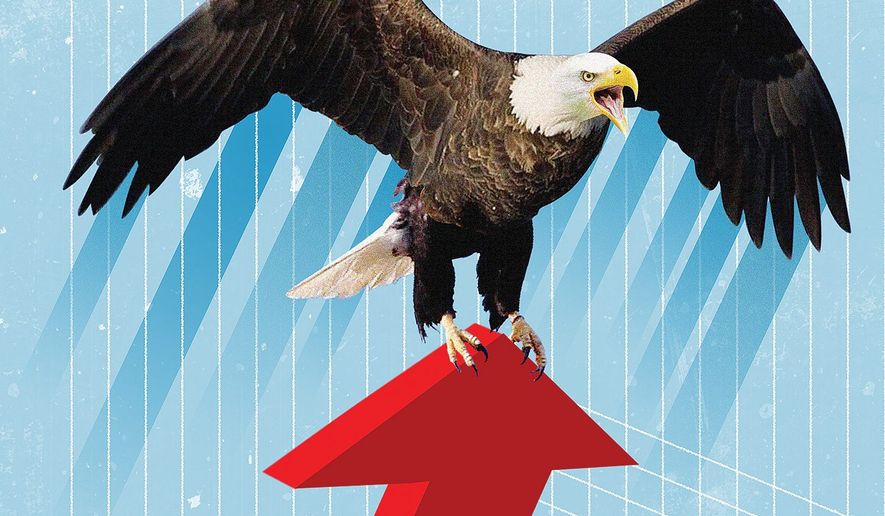OPINION:
The economy is on a tear, but how well it addresses the salient issues of the era — inequality and competition with China — depends importantly on how much the Federal Reserve tolerates surging inflation and how Congress reworks President Biden’s infrastructure plan.
Tangible signs abound of the return to normalcy. Airlines are booking middle seats, hotel occupancies are up, Disneyland and concert venues are reopening, and crowds are forming in Times Square.
Consumers are spending pent-up savings from stimulus checks.
The economy is expected to grow at its best pace since Ronald Reagan was president, but the global economy’s ability to keep up America’s appetite is severely stressed. Supplies of the building blocks of what we buy — computer chips for cellphones and cars, plastics used to make everything from hospital gowns to packaging, agricultural commodities, lumber and more — are stressed, and the material prices paid by businesses are surging.
Levi Strauss, consumer products companies like General Mills, Hormel, Kimberly-Clark and automakers are raising prices, and inflation is expected to reach 3% by June.
Federal Reserve Chairman Jerome Powell predicts rising prices will prove temporary, but he is tightening monetary policy. Last year, the Fed printed enough money to purchase more than $3 trillion in Treasury, state and corporate securities, whereas this year the pace is less than half as much. Consequently, the interest rate on bellwether 10-year Treasuries is up significantly.
However good things may look here, the EU remains stuck under the yoke of a bungled vaccine rollout and still has not dispersed to member states its much heralded €850 billion stimulus funds. Infections are surging and new strains of COVID-19 are percolating in the developing world.
A near perfect storm has further shifted wealth to the United States and China.
The pandemic unleashed the potential of technology for virtual work in many professions and Internet commerce. In varying measures, our cities are in for wrenching post-pandemic changes — less office space and more middle- and upper-class housing replacing commercial real estate and decline in retailing.
To accommodate health risks in the workplace and political pressures to raise wages, we can expect even more automation on factory floors, in warehouses and at retail checkout. And a paradox of structural unemployment for those without sophisticated technology, medical, business or other professional skills alongside a booming economy.
Homelessness and hunger will grow and increasingly embarrass the world’s richest nation. BLM, AOC, the mainstream media and the professional class of the victim’s movement will play the race card, but the real problems are failures that have no color in our educational system and immigration policies.
Only accelerated growth in technology industries can drive demand and provide the money to pay for more jobs and higher wages in law, medicine and other service occupations. And in turn, reverse declining opportunities for lower-skilled workers making sandwiches, cleaning homes, staffing customer service lines and in warehouses.
We are talking 3% growth or more — a terribly illusive target.
Mr. Powell is willing to endure prolonged inflation above 2% to find it, but he ought to consider that managing the 10-year Treasury rate. That rate powerfully affects not just mortgage rates but also the capital available in equity markets that funds high-tech startups. And it is as important as the Fed’s official monetary policy target — the federal funds rate.
Still, Americans must up their game. Subsidies lavished on high tech in China, Korea and elsewhere translate into lost jobs in America making computer chips and 5G infrastructure but also jobs in law, business, medicine, restaurants, fitness centers and dry cleaners.
Fewer jobs and wage pressures for the lower half isn’t just about import competition, automation and alleged monopoly abuses the left rails about but can never seem to be able to prove in court. It’s about the Republican Party’s failure to recognize that industrial policy is not a moral failure but a contest for global leadership with China. And the Democratic Party has a penchant to see every spending imperative as an opportunity to inflate sexism, racism, classism and generally promise to create the Garden of Eden.
President Biden’s infrastructure plan would spend too little on roads and bridges, too much on the Green New Deal and other liberal causes but does get one thing right. Its support for R&D, manufacturing, Internet access and semiconductors is spot on.
Only by wresting leadership in technology across the board — not in jobs count but in patent filings — is America going to have a pie big enough to carve into a just society.
• Peter Morici, @pmorici1, is an economist and emeritus business professor at the University of Maryland, and a national columnist.




Please read our comment policy before commenting.